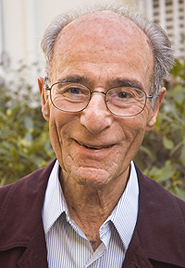Berkeleyan
Obituary
Thomas Rosenmeyer
![]()
21 February 2007
Thomas G. Rosenmeyer, a professor emeritus of Greek and of comparative literature, died at his home in Oakland on Feb. 6. He was 86.
 Thomas Rosenmeyer |
Born in Hamburg, Germany, in 1920, Rosenmeyer fled to England in the late 1930s and studied at the London School of Economics until he was interned there along with other German nationals and Jewish men; later, he was transferred to an internment camp in Canada.
After his release he was admitted to McMaster University, near Toronto, where he completed his undergraduate degree in classics in 1944. He earned a master's degree, also in classics, at the University of Toronto in 1945 and went on to do his doctoral studies at Harvard University, receiving his degree in classical philology there in 1949 with a dissertation on Plato.
After teaching classics at the State University of Iowa (1947-52), Smith College (1952-55), and the University of Washington (1955-66), he arrived at Berkeley in 1966, taking a joint position in classics and comparative literature. He immediately became one of the main shaping forces of that new, and soon preeminent, program, said Mark Griffith, a professor of classics. Rosenmeyer served terms as chair of each department and, as acting dean of humanities, helped to organize what is now the Townsend Center for the Humanities.
Upon his retirement in 1990, the year that he delivered one of the two annual Faculty Research Lectures, Rosenmeyer received the Berkeley Citation, the highest award available to a faculty member.
As a scholar, said Griffith, Rosenmeyer became one of his generation's leaders in classical Greek literature because of his distinctive combination of traditional philology and flexible, finely nuanced literary analysis.
His first book, The Masks of Tragedy (1963), collected several provocative essays on Greek plays. The Green Cabinet: Theocritus and the European Pastoral Tradition (1969), said Tony Long, the Irving Stone Professor of Literature, brings "a wide-ranging chronological and cultural perspective to the study of Greek and Latin poetry, points up interconnections between literature and philosophy, and shows the continuing relevance of the classics for the understanding of later literature." Other books included The Art of Aeschylus (1982) and Senecan Drama and Stoic Cosmology (1989).
Rosenmeyer's scholarship was acknowledged by two Guggenheim Fellowships, election to both the American Academy of Arts and Sciences and the American Philosophical Society, and his appointment in 1989 as president of the American Philological Association.
He lectured in the United States and abroad. Before and after his retirement, he held several visiting appointments, including a semester as visiting professor at Harvard. Although hampered in his last years by deafness, he maintained connections with his friends and colleagues, communicated far and wide by e-mail, and pursued an active life of reading, research, and writing.
His wife of 56 years, Lilo, died last year. He is survived by two daughters, Patricia Rosenmeyer of Madison, Wisc., and Katharine Fabunan of Fresno, and by three grandchildren.
A digital bibliography of Rosenmeyer's work through 1989 can be found under the heading "Cabinet of the Muses" at the classics department's eScholarship Repository site, repositories.cdlib.org/ucbclassics.

